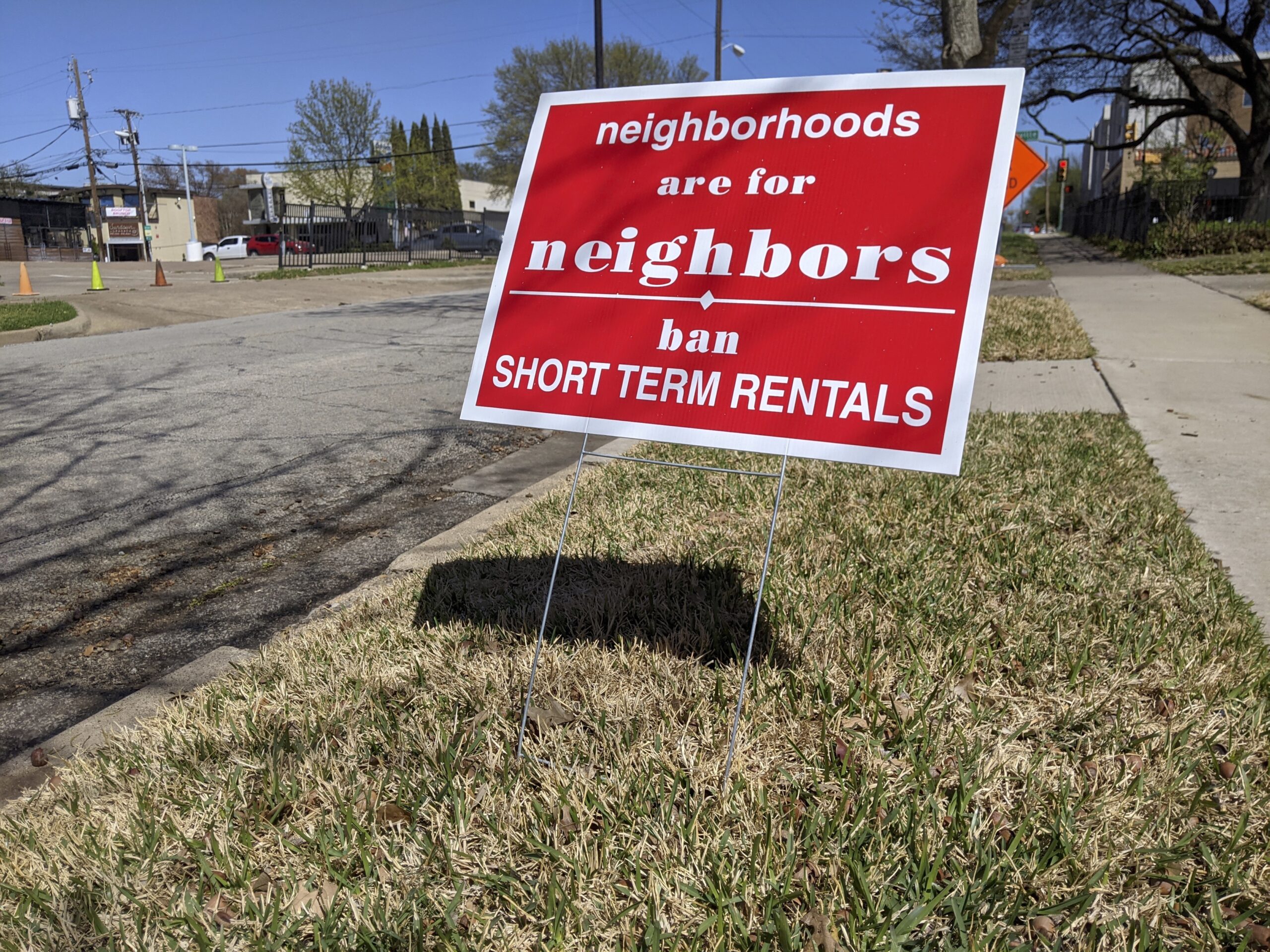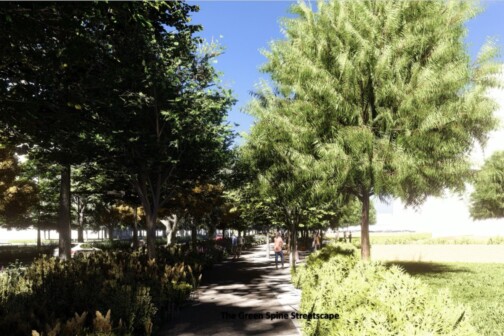The Dallas City Council’s marathon meeting earlier this month culminated in twin measures that will rein in the short-term rental market in the city. Potential lawsuits from operators were treated as a foregone conclusion.
“I’m just saying, I don’t fear courts,” said Councilwoman Carolyn King Arnold. “Let’s dress up and go.”
By December, short-term rental operators (who largely use Airbnb and Vrbo to list their properties) in single-family residential neighborhoods who still want to generate revenue will have to rent their properties to long-term tenants or sell. The Council declined to grandfather existing registered STRs into that zoning change, so even the most law-abiding operators are eliminated.
STRs can operate in multifamily residential or commercial zoning, but the Council also enacted maximums that are designed to prevent the rentals from overwhelming developments. They aren’t allowed at all in buildings with 20 or fewer units.
The Council also chose to enact regulations for the remaining STRs. City staff, as well as Airbnb and Vrbo operators, were in favor of the city enacting regulations but felt the outright ban by way of zoning was unfair.
Those against STRs have maintained that they are a lodging use, which are prohibited by city code from operating in single-family neighborhoods. Operators and owners of STRs insist the opposite and argue that the courts have set precedents that block bans by way of zoning.
There is a hodgepodge of case law in response to how local governments have sought to regulate the industry. It has resulted in much confusion and hours-long executive sessions for the City Council. Dallas’ new ordinance appears destined to be sorted out in court.
We talked to five operators shortly after the Council’s vote last week, seeking out “superhosts” and “premier hosts” on Airbnb and Vrbo, respectively. While nearly all of them are still exploring their next steps, they say they feel that their willingness to follow the few rules the city had prior to Wednesday was overlooked in the zeal to eliminate bad hosts.
“I think most STR owners want to help the city crack down on any bad STRs. How are we supposed to ally with the city when they demonize us and treat us like the enemy?” asked Robert Wiley. In December, Wiley, who is an attorney, sent then-City Attorney Chris Caso a letter outlining how the courts have ruled in STRs.
“This is not an argument with two sides. Every single Texas court to examine the issue has held as follows: When a municipality removes the right to short-term lease from existing STRs it is an illegal taking,” he warned in the letter.
Holly Hartman Scudder, who has operated an STR with her father since 2017, said that they felt that they’ve done their best to make sure that neighbors weren’t inconvenienced by their guests.
“We feel cheated because there is a lot that goes into running a short-term rental. We created a short-term rental because that’s what made sense for our family, and we have followed all the rules by the city,” she said. “We registered our property with the city and have consistently made our hotel occupancy tax payments, as well as our property taxes. So it is aggravating to be banned.”
Ashley Martzen, who often signed up to comment at meetings and briefings when STRs were on the agenda, echoed that feeling.
“You accepted our money. We ran peacefully for many years, and now you’re all of a sudden going to redefine it and prohibit us, and pay nothing back or even grandfather us,” she said.
Martzen, who is also a lawyer, said she questions the idea that short-term rentals should be held to the same standard as hotels.
“We don’t have the impact of a hotel, we don’t have the traffic impact, we don’t have all the staff it takes to run a hotel,” she said, adding that the terms of the rental length shouldn’t define whether a property is being used residentially. “There’s nothing magical about 30 days. And if it’s a bad tenant, you’re stuck with them for a lot longer than 30 days because there are eviction proceedings.”
All five operators said they felt that their diligence in paying their hotel occupancy taxes to the city should count for something. They also said that they felt that the city setting up a system for registry and accepting those payments meant that their land use was acceptable. At least two pointed out that the instructions from the city to STR operators never warned that they weren’t legal.
Every operator we spoke with said that they understood the frustration with irresponsible operators—because it was frustrating for them as well.
“Dallas saw an STR investment rush the past two years. A lot of people with little property management experience joined the sector,” said France Falcon, who operates several properties with Alan Hernandez as Citizen Nomad on Airbnb. “There were a lot of ‘Airbnb Gurus’ going viral, selling online courses claiming this is an easy way to make passive income, creating unrealistic expectations for investors. This coupled with really low interest rates, made the STR market in Dallas become fairly saturated.”
Falcon said that the party houses didn’t offer the experiences that make properties stand out, so to survive and compete with better-performing STRs, they lowered their prices.
“You would see three bedroom homes in single family neighborhoods on STR platforms for the cost of a one star motel room,” she said. “I think inexperienced property management was a major contributing factor to the problematic situations that were highlighted by the anti-STR crowd.”
Sandra “Jaxsie” Figueroa said those party houses impacted her own guests.
“Two of my listings are next to ‘party’ homes and TikTok-inspired hosts who are trying to make a quick buck,” she said. “I have been plagued with trash, noise, and threats to safety as well. I completely understand how the sudden unregulated boom in this industry over the past few years has created significant challenges for cities and its citizens to navigate.”
Most of the hosts said they took measures to ensure their guests were respectful of the neighborhoods in which they were temporarily staying. Martzen’s listings are in her own neighborhood. Scudder said they reside next door to their rental. Falcon said they installed doorbell cameras to monitor how many people are coming and going at the property and they have set limits on guests.
“Most importantly, our neighbors also have our phone numbers,” Falcon said. “We let them know they can text us at any time, if there’s ever an issue with guests.”
Figueroa owns three properties, including a 6-unit apartment complex on Henderson Ave. that is a frequent stop for traveling nurses, relocating professionals, and families of hospital patients, she said.
“The immediate neighbors were not even aware that it was a short-term rental for the past two years,” she said. “I have never had a complaint or caused any nuisance issues in my six years of hosting in Dallas. I put a great deal of effort and investment into revitalizing my properties and frequently host the overflow family of neighbors.”
All five operators we talked to also felt that the Council could have avoided litigation if they had opted to grandfather already registered owners in.
“STR owners wouldn’t be happy with a ban on future rentals, but we could live with it,” Wiley said. “By not grandfathering, the city gets a legal challenge that may overturn the ban entirely. We wouldn’t be raising money and hiring lawyers if they had grandfathered.”
Martzen argues that by zoning STRs out of single-family neighborhoods, the city also eliminated the fastest way to shut one down: by using the regulations it passed Wednesday night. Those regulations, she believes, don’t apply to what can’t legally operate in the city.
“You want to enforce it? You don’t have a regulatory regime to point to and say, ‘You violated section XYZ of the short-term rental enforcement code,’” she said. Instead, the city will be forced to pursue an illegal land use claim.
City Manager T.C. Broadnax acknowledged in last week’s meeting that enforcing an illegal land use would start with code enforcement. He said the matter would go through “our normal processes of abating the illegal land use.” He also said that the city’s code enforcement department does not have the staff to shut down the estimated thousands of STRs currently operating in single-family neighborhoods.
“I don’t think people have any idea how hard it will be to gather enough evidence to prove a place is being used as a short-term rental,” Marten said. “Just because it’s listed on Airbnb is not proof. How do you know the people coming in and out aren’t 30 day renters?”
A few of the operators we talked to said they would likely either sell or reluctantly pivot to long-term rentals. All expressed doubts that their properties would meaningfully contribute to the city’s affordable housing stock, which was a talking point for supporters of the ban. They own homes in areas that command higher rents or higher sale prices, and they’ve put a lot of work into them.
“I purchased my properties when interest rates were as low as 2.25 percent, I cannot sell these properties in a 7 percent (or more) interest rate market,” Wiley said. “I cannot recoup the renovations and the furniture. I have never been interested in long-term renting. Like many STR owners, I followed the rules and I invested in my city. Now I’m left with the feeling I’d have been better off investing in Austin, Houston, or anywhere else.”
Olive Talley, who helped lead the charge to get STRs excised from residential neighborhoods, was unmoved. We asked if STR operators who were doing their part to be good neighbors were being unfairly punished.
“Not at all. Let’s turn the question around: Is it fair to allow STR operators to disregard the zoning that was in place decades before they bought their properties to operate as STRs to the detriment of their neighbors—all in pursuit of higher profits?” she asked. “And when their pursuit of higher profits drives up rents, and appraisal rates of their neighbors and removes housing stock from the neighborhood, it is the neighbors and neighborhoods that have been unfairly punished.
“Whether or not someone thought they were doing their part to be a good neighbor, these businesses were always operating illegally,” she said. “Neighbors bought homes in residential zones where lodging is prohibited and relied on that zoning because they wanted to live among other neighbors.”
The city may soon get a preview of what it will face in court. A group of STR operators filed suit last week against the city of Fort Worth, where its Council passed an ordinance that basically bans short-term rentals in residential areas, and regulates the ones still permitted to operate.
The lawsuit has more than 100 plaintiffs who argue that the city is discriminating against homeowners, and attacking already settled property rights.
“The appellate courts and the Texas Supreme Court have been consistent that short-term rentals are not commercial activity,” Graigory Fancher, a lawyer for the Fort Worth law firm Bourland, Wall, & Wenzel, who filed the lawsuit on behalf of the property owners, told The Fort Worth Report.
The suit also says that by adding to its enforcement standards in an updated ordinance in February, it was “prying into homes and private lives to enforce the status of not remaining in a home long enough to qualify as a residential tenant.”
Depending on who you ask, the case law regarding STRs is clear, which makes it extremely hard to delineate on which side the courts will actually rule. To Talley and her fellow advocates against short-term rentals, it’s obvious that the law is on their side. If you ask short-term rental operators, the law is on their side.
In the end, it looks like both Dallas and Fort Worth will become additional notations in what Fort Worth Mayor Mattie Parker called an “evolving issue.”
See you in court.
Author






